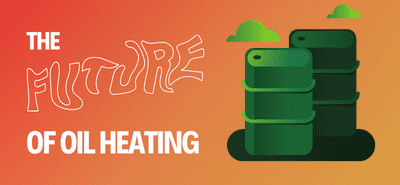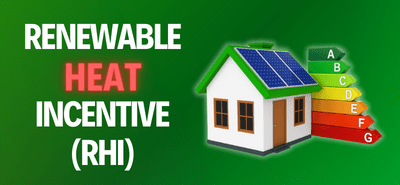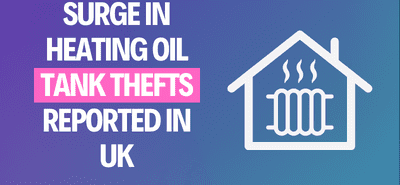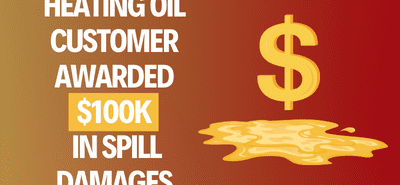Oil Heating the Most Environmentally Friendly……..
Oil Heat … Efficient!
Heating and hot water system efficiency is a measure of the amount of usable heat extracted from the potential energy of the fuel. For example, if your heating system is evaluated at 85% efficiency, it means that 85 pence of every pound spent for heat and hot water are consumed within the home. The balance is exhausted through your chimney or flue exhaust.
Thus, the combination of high efficiency and minimal exhaust of emissions are desirable traits for a home heating fuel. Oil-fired equipment has always provided these features for both heat and hot water.
There are may ways to compare heating system efficiency. The most widely accepted measure is the U.S. Dept. of Energy’s Annual Fuel Utilization Efficiency (AFUE).
Using this benchmark, Oil-heat gets excellent ratings. Annual Fuel Utilization Efficiencies of new oil equipment range from 83% to 94%.
The average gas unit sold has an AFUE in the low 80’s, while ratings on individual gas units vary from 78% to 95%. While the high end efficiency of some natural gas systems may look attractive, they exhibit higher water vapor in the exhaust than an Oil heat system- which can be corrosive to the heating unit.
Electric resistance heat has between 27% and 31% AFUE; air to air heat pumps between 51% and 62%; and geothermal heat pumps 76% to 82% AFUE. Electric heat is inefficient because nearly two-thirds of the heat value of the fuel is lost in the generation and transmission. With Oil heat, you create usable heating energy right at your house and distribute it throughout your home.
Oil Heat is … Clean!
Modern oil heat systems are among the cleanest of combustion devices. New oil burners release near zero levels of smoke and combustion discharge. Residential oil burners produce less than one-third of one percent (.003) of total particulate emissions in the UK each year.
Emissions from residential gas burners are about the same as from equivalent size oil burners, according to government research agency studies. Neither fuel releases particulate matter of any consequence.
While electric heat at the point of use has no emissions at all, the power plant creating the electricity may be giving off significant emissions depending on how power is generated.
Oil Heat is … Environmentally Sound!
Heating oil is environmentally benign. It is non-toxic, contains no carcinogens, and is biodegradable. Competitor innuendoes and exaggerated media reports that depict heating oil as an environmental hazard are unjustified.
Residential oil tanks do not present a threat to human health or the environment. A properly installed and maintained oil tank can last for decades.
Oil heat has the least environmental impact of any type of space heating and hot water fuel, attributable to its high efficiency and clean burning. Natural gas and propane are similarly benign, while electric, coal, and wood heat are far more detrimental to air quality.
Oil Heat is … Economically Smart!
The price of energy in the region where you live is the most dominant influence on total heating costs.
For example: The installed cost of an electric heat system may look attractive, but when you calculate the annual operating costs for electric power in particular, any first time savings vanish.
For the past four years the cost for Oil heat has been consistently lower than comparable natural gas costs. In climate regions of the country where Oil heat is dominant, the cost to a homeowner for utility supplied natural gas in 1995 can be as much as 40% more than Oil heat! Energy analysts do not foresee that the price advantage for Oil heat will diminish anytime soon.
The best way to compare energy prices is to calculate the price per BTU, a unit of heating value, for each fuel.
- Heating Oil contains 138,690 BTUs per gallon.
- Natural Gas has 100,000 BTUs per therm. It takes 1.4 therms to equal the heat content of one gallon of heating oil.
- Kerosene has 131,890 BTUs per gallon; 1.05 gallons equals the heat content of one gallon of heating oil.
- Propane has 91,500 BTUs per gallon; 1.52 gallons equals the heat of one gallon of heating oil.
- Electricity has 3,413 BTUs per kilowatt hour (kwh); 40.6 kwh equals the heat content of a gallon of heating oil.
Energy prices can vary widely across the country. Your Oil heat dealer can provide you with the information to accurately compare energy prices in your area.
Oil Heat is … Safe!
Oil, gas, electric heat all have commendable safety records when the equipment is installed properly and maintained regularly. However, when heating units malfunction safety hazards can occur.
Should that situation arise, Oil heat offers important safety advantages:
- Heating oil is non-explosive. If a heating oil leak should occur, it is not an explosive hazard. When natural gas leaks, an explosive mixture of air and fuel forms rapidly.
- Heating oil will not burn in a liquid state. If you were to place a lit match into a vial of heating oil, the match would be extinguished because heating oil in liquid form is well below it’s flash point of 140 degrees F, the temperature at which it begins to vaporize in order to fire inside a burner. By contrast, natural gas will burst into flames when mixed with air if a match is struck in their presence.
Oil heat enables you to have a supply of fuel oil stored safely on your property.
Do not worry about the weather, because the oil in your tank is yours to use for heat and hot water whenever you want. By comparison, in extremely cold weather, natural gas customers can be subject to pressure drops in the pipelines. A severe pressure drop can result in total loss of heat.
Oil Heat is … A Sensible Selection!
Heating oil is environmentally benign. It is non-toxic, contains no carcinogens, and is biodegradable.
Competitor innuendoes and exaggerated media reports that depict heating oil as an environmental hazard are unjustified.
Residential oil tanks do not present a threat to human health or the environment. A properly installed and maintained oil tank can last for decades.
Oil heat has the least environmental impact of any type of space heating and hot water fuel, attributable to its high efficiency and clean burning. Natural gas and propane are similarly benign, while electric, coal, and wood heat are far more detrimental to air quality.










